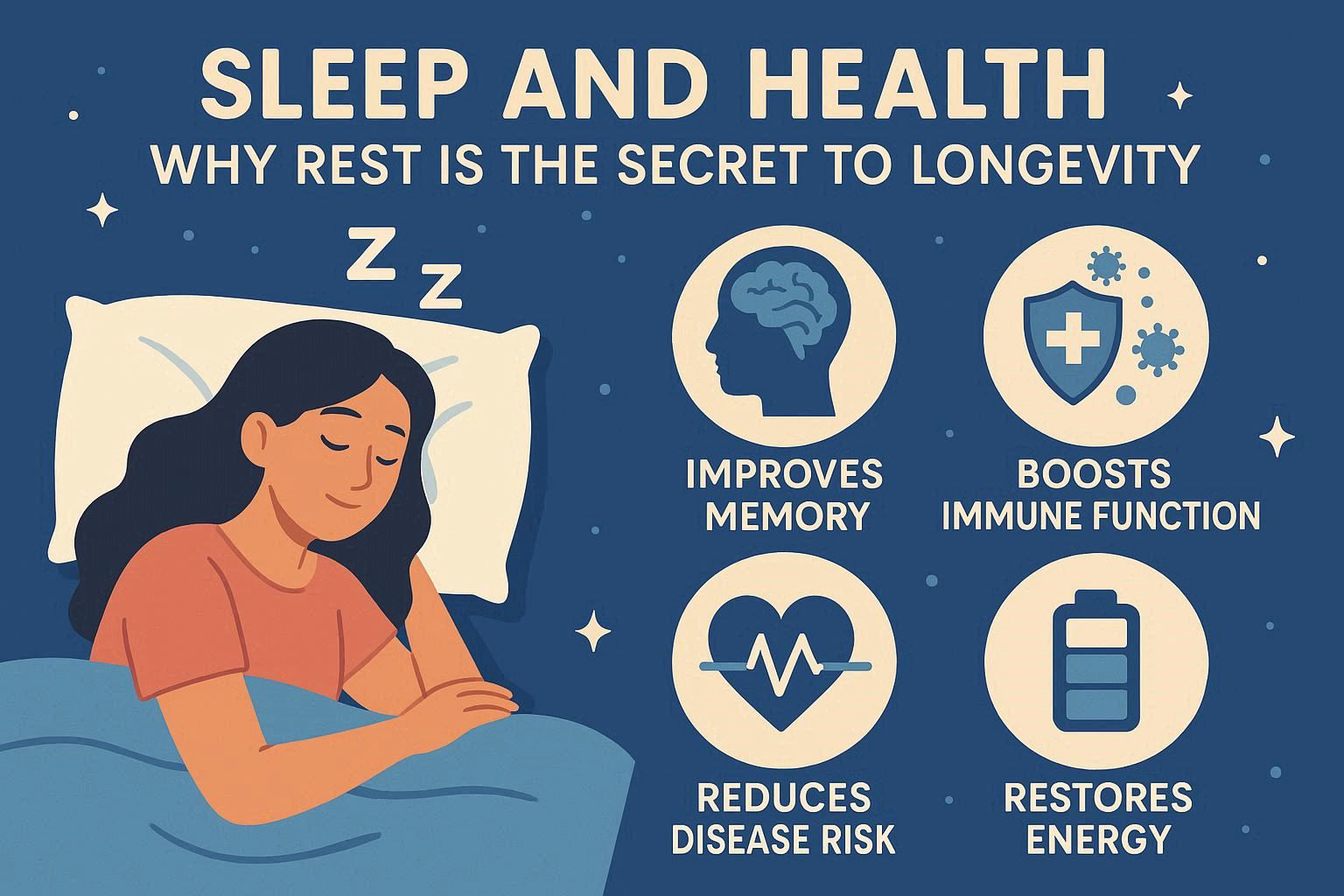In a world that never sleeps, many people treat rest as optional. Late nights, busy schedules, and digital distractions have made quality sleep a luxury rather than a priority. Yet research shows that sleep is not just a way to recharge—it is one of the most important foundations of health and longevity. Without proper rest, the body and mind cannot perform at their best.
This article explores why sleep is essential for health, the risks of chronic sleep deprivation, and practical strategies to improve sleep quality in 2025.
1. The Science of Sleep
Sleep is a complex biological process that restores the body and brain. During sleep, the body cycles through different stages:
- Light Sleep – Helps the body transition into deeper rest.
- Deep Sleep – Critical for physical recovery, muscle repair, and immune function.
- REM Sleep – Essential for memory, learning, and emotional balance.
Each stage plays a unique role in maintaining overall health, making a full night of rest vital for longevity.
2. Why Sleep Is the Secret to Longevity
Quality sleep impacts nearly every system in the body. Some of its benefits include:
- Improved Brain Function – Better focus, creativity, and decision-making.
- Stronger Immune System – Increased ability to fight illness and recover from infections.
- Heart Health – Reduced risk of hypertension and cardiovascular disease.
- Weight Management – Balanced hormones that control appetite and metabolism.
- Mental Health – Lower stress, anxiety, and risk of depression.
These benefits demonstrate why sleep is one of the most powerful tools for a longer, healthier life.
3. The Risks of Sleep Deprivation
Chronic lack of sleep does more than cause fatigue—it can have serious long-term health effects. Risks include:
- Weakened immune system and frequent illness.
- Increased risk of diabetes and obesity.
- Higher likelihood of heart disease and stroke.
- Memory loss, poor concentration, and reduced productivity.
- Emotional instability, stress, and mood swings.
Studies show that consistently sleeping less than six hours a night can shorten life expectancy, underscoring the critical role of rest in longevity.
4. Common Sleep Disruptors in Modern Life
Several lifestyle factors in 2025 interfere with healthy sleep:
- Screen Time – Blue light from phones and computers disrupts melatonin production.
- Irregular Schedules – Shift work or inconsistent sleep patterns confuse the body’s natural clock.
- Caffeine and Stimulants – Excessive consumption can keep the brain alert at night.
- Stress and Anxiety – Racing thoughts make it difficult to relax and fall asleep.
- Unhealthy Sleep Environment – Noise, light, and uncomfortable bedding reduce rest quality.
5. How Much Sleep Do We Really Need?
Sleep needs vary by age, but most adults require 7–9 hours per night. Teenagers often need closer to 9 hours, while older adults may naturally sleep less but still require deep, restorative rest. The key is not just duration, but also the quality of each sleep cycle.
6. Strategies for Better Sleep
Fortunately, improving sleep is possible with consistent habits. Proven strategies include:
- Maintain a Sleep Schedule – Go to bed and wake up at the same time daily.
- Create a Sleep-Friendly Environment – Dark, cool, and quiet bedrooms promote better rest.
- Limit Screen Use – Avoid devices at least one hour before bedtime.
- Relax Before Bed – Practices like meditation, stretching, or reading calm the mind.
- Avoid Late Caffeine – Stop coffee or energy drinks at least 6 hours before sleep.
7. The Role of Technology in Sleep Health
Ironically, technology contributes to poor sleep but also offers solutions. In 2025, tools such as sleep-tracking wearables, smart mattresses, and AI-powered apps help people monitor and improve rest. Features include:
- Tracking sleep cycles and duration.
- Analyzing breathing, heart rate, and movement during the night.
- Providing personalized recommendations for better sleep habits.
When used responsibly, these technologies encourage healthier routines and greater awareness of sleep quality.
8. Sleep and Mental Health Connection
Sleep and mental health are closely linked. Poor sleep increases stress, irritability, and risk of depression, while good sleep enhances emotional balance and resilience. Practices like mindfulness meditation, journaling, and deep breathing exercises can improve both mental health and sleep quality.
9. Cultural Shifts Toward Rest
In the past, lack of sleep was often seen as a sign of hard work. In 2025, however, more people recognize that rest is essential for productivity and well-being. Workplaces, schools, and even governments are promoting healthier sleep habits through flexible schedules, wellness programs, and public health campaigns.
10. Future Outlook: Sleep as Preventive Medicine
Looking ahead, sleep will play an even greater role in preventive healthcare. Doctors are increasingly prescribing lifestyle changes instead of medication, with sleep at the top of the list. Advances in neuroscience and AI may lead to better treatments for insomnia and other disorders, ensuring that more people get the rest they need for a longer, healthier life.
Conclusion
Sleep is not a luxury—it is a biological necessity and one of the most powerful factors for longevity. By understanding the science of rest, recognizing the risks of deprivation, and adopting healthier sleep habits, individuals can protect their physical and mental health. In 2025 and beyond, prioritizing sleep may be the simplest and most effective secret to living longer and thriving every day.

